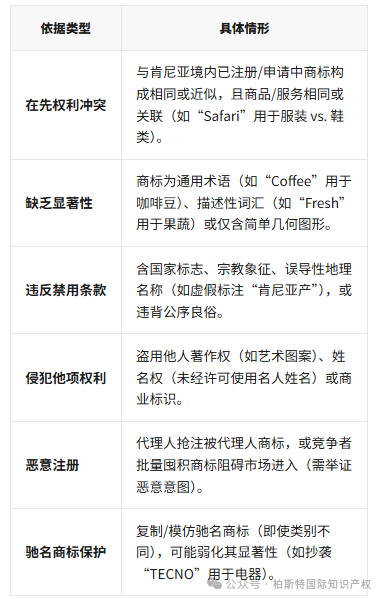- Knowledge
Preface:
The trademark opposition system in Kenya is an important component of its trademark legal system, aimed at resolving trademark conflicts through legal procedures, preventing improper registration, and maintaining fair competition in the market. This system is managed by the Kenyan Intellectual Property Office(KEIPO)Leading, with standardized processes and high timeliness. The following is a detailed introduction to the trademark opposition system in Kenya, covering the accepting institution, timing of filing, application basis, process, and cycle.
1、 Trademark opposition acceptance agency
Kenya Intellectual Property Office(KEIPO)It is the only statutory body responsible for trademark affairs in Kenya, under the jurisdiction of the Kenya Industrial and Trade Promotion Authority(KIPPRA). Its core functions include:
1、Trademark Examination and Announcement:
Conduct formal examination (document integrity) and substantive examination (distinctiveness, prohibited clauses) on trademark applications, and after approvalKenya Intellectual Property Official GazetteNotice.
2、Objection handling:
Receive objection applications, review legal basis, organize evidence exchange and hearings, and make administrative rulings.
3、Proxy requirements:
Foreign companies or individuals must entrust a locally registered trademark agent in Kenya to submit an opposition application.
Local enterprises can submit on their own, but it is recommended to entrust professional agents to cope with the complexity of the procedures.
significance:KEIPOEnsuring the authority of the trademark system through centralized review often faces challenges in terms of administrative efficiency due to resource constraints.
2、 Timing of Trademark Objection
The exercise of the right of objection is subject to strict time limits and cannot be extended
1、Announcement Launch:
After the trademark is reviewed,KEIPOPublish trademark details (design, category, applicant, etc.) in the official gazette.
2、Window period:
From the date of announcement, the objector shall3Submit a formal objection application within one month.
3、Consequences of overdue:
No objections within the deadline: The trademark will be automatically registered and a certificate will be issued.
No objection beyond the deadline: Rights can only be claimed through invalidation procedures or judicial litigation, which significantly increases the cost and difficulty.
Key point: Enterprises need to establish a trademark monitoring mechanism and track official announcements in a timely manner (updated monthly).
3、 Basis for Trademark Objection Application
Objections must be based on《1964The Kenyan Trademark Law(2002The annual revised version specifies the reasons, and common bases include:

burden of proof:The objector needs to submit a Kenyan trademark registration certificate, sales contract, advertising materials, etc. to prove prior rights or the possibility of confusion.
4、 Trademark opposition process
The objection procedure is divided into five stages, and the entire process is carried out byKEIPOSupervision:
1、Submit an objection application (Section)0-1Months)
Dissenters toKEIPOSubmit an objection application, accompanied by legal basis, factual statements, and evidence, and pay the official fee (approximately)100-200US dollars).
2、KEIPOFormal Review (Section)1-2Months)
12KEIPOReview whether the objection materials meet the format requirements, and if they are not qualified, make corrections within a specified period of time.
3、Respondent's defense (No3-5Months)
KEIPODeliver the objection materials to the applicant, who needs to60Submit the defense statement and counter evidence within the day.
4、Controversy Refutation (Part 1)6-7Months)
The objector may add new evidence to the defense content, with a deadline of30Day.
5、KEIPOJudgment (Section)8-24Months)
KEIPOReview the materials of both parties, hold a hearing, and make a final decision:
Objection established: The trademark application is rejected and the applicant may appeal.
Objection not established: Registration is approved, and the objector may appeal to the High Court of Kenya.
Remedy: The losing party may seek relief after the award has been served30File an administrative lawsuit with the High Court of Kenya within the day.
5、 Trademark opposition period
It usually takes18-30Months, specifically affected by the following factors:
Standard process:
Announcement period(3Months)→Defense period(2Months)→Refutation period(1Months)→ KEIPOJudgment(12-24Months).
Extended variables:
Evidence needs to be notarized and authenticated (especially overseas documents), hearing procedures initiated, both parties applying for extension or case backlog.
Appeal stage:If entering into judicial proceedings, there may be additional charges2-3Year.
Practical difficulties:
1、KEIPOThe review efficiency is relatively low, and the arbitration cycle is longer than in neighboring countries such as Ethiopia and South Africa.
2、Complex evidence authentication: Overseas documents require dual authentication (notarization) by Kenyan embassies and consulates abroad Consular authentication).
Institutional Value and Challenges
The trademark opposition system in Kenya ensures the certainty of trademark rights through procedural justice, but insufficient administrative resources and delayed judicial remedies remain the main bottlenecks. International enterprises need to adopt the following strategies:
1、Advance layout: before entering the market6Submit a trademark application within one month and reserve time for opposition monitoring.
2、Localized agency: Entrust a professional law firm in Nairobi to handle the objection process and avoid procedural flaws.
3、Evidence reserve: Systematically preserve evidence of trademark use (such as sales invoices, advertising records) to address potential objections or invalid disputes.
With Kenya's accession to the Madrid Protocol and the process of regional intellectual property integration in Africa, the system is expected to evolve towards efficiency and standardization.




